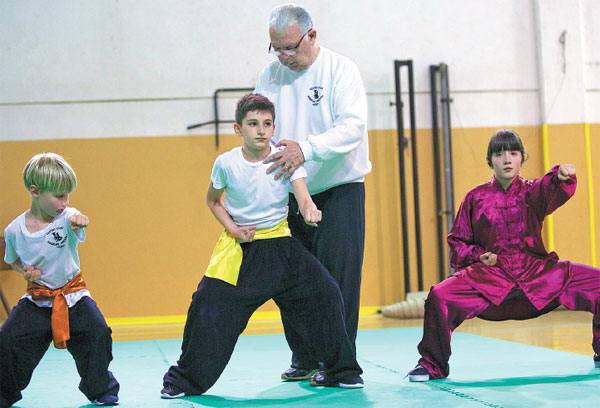Italy's cradle of kung fu culture
Retired banker now devotes life to teaching ancient skills to new generation
|
Luca Ghinolfi, 75, instructs young students in the ancient art of wushu at the Center for the Studies of Oriental Cultures, which Ghinolfi founded in Lavagna, Italy, in 1972. Jin Yu / Xinhua |
LAVAGNA, Italy - "Master Ghinolfi is like a father for me," said Simone Mangiante, speaking from an unlikely kung fu outpost in the tiny port village of Lavagna in northern Italy.
Luca Ghinolfi, a 75-year-old retired bank manager, became hooked on traditional Chinese martial arts (wushu) in the 1970s.
Now, almost half a century later, his pupils' passion and enthusiasm is a testament to their teacher's dedication.
"I remember very well the day I won gold at the 2014 world championship in Chizhou," Simone recalled during a break from training at the Center for the Studies of Oriental Cultures, which Ghinolfi founded in 1972.
"The night before, I had a fever. My teacher called from Lavagna and said: 'Don't worry. Sleep well. Let it be.' The next day I tried my best and succeeded. I was moved to tears."
Another of Ghinolfi's star students, Arianna Romano, showed off souvenirs gained from three world championships for the traditional tai chi chuan, and two European championships for the modern tai chi chuan.
"I like tai chi because it is complete kung fu," she said. "As well as martial arts, it includes philosophy, culture and traditional Chinese medicine."
Ghinolfi initially practiced judo, karate, yoga and zen, but his love affair with tai chi began in 1984 after seeing a presentation in nearby Genoa by Yang Li, a scholar from Beijing Sport University.
All these years later, his fascination burns just as bright. Every morning he rises at 5:30 to begin his routine with meditation and wushu practice. After lunch, he reads books about martial arts and prepares his training courses.
"It's continuous research," said Ghinolfi, who is indebted to Chinese masters like Yu Yongnian and Wu Dong.
"Father Yu Yongnian treated me as a family member. As the old saying in China goes: 'Once a teacher, always a father,' so I always call Yu Yongnian father," he said.
Ghinolfi often visited Yu's home in China, where they practiced tai chi, drank Chinese tea and discussed Tao Te Ching, or Dao De Jing, the Chinese classic regarded as the fundamental text for both philosophical and religious Taoism.
"The sage does not accumulate. The more that he expends for others, the more he possesses of his own, the more he gives to others, the more he has for himself," Ghinolfi quotes from the text.
"Be lenient with others. This piece of advice from Master Yu benefits my whole life. I will be a bridge, passing all the knowledge to the next generation."
That process was boosted many years ago when Ghinolfi and other Italian kung fu enthusiasts founded the Italian Federation of Wushu and Kung Fu.
Now they have many students all over Italy. At his center in Lavagna alone, Ghinolfi has around 180 students, ranging in age from 10 to 88.
Many have won major prizes and awards, and many are following in the footsteps of their master.
"This summer I will go to Beijing Sport University to prepare for the world championships in Russia. I will train with Master Wu Dong," said Simone, who helps Ghinolfi teach kids two nights a week.
"Seeing the students improve through the years is a huge accomplishment for me."
Xinhua

















